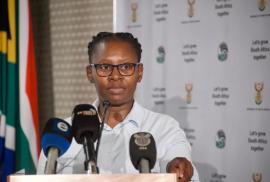
By Nomonde Mnukwa
South Africa is the first African country to lead the influential group of the world’s largest economies, known as the G20. South Africa’s G20 Presidency provides global visibility in all provinces as the country prepares to give world leaders an ubuntu welcome to this premier forum in November.
As we host the G20 Leaders’ Summit, which will be convened under the theme “Solidarity, Equality, Sustainability”, we seek to build the nation, continent and the world we dream of, through equal opportunities for growth that will impact generations to come.
The G20 features major economies, comprising two-thirds of the global population which
represents 85 percent of global GDP and 75 percent of international trade. The grouping holds major influence in the world and remains key in ensuring that all nations can develop based on solidarity, equity and sustainability, which is also the theme for the G20 in South Africa.G20 provides a platform for world leaders to work together to identify solutions for global challenges and formulate pathways for global economic stability and development.
Over and above the obvious vast economic benefits, the G20 is more than just a global economic forum. It presents a crucial opportunity to ignite social transformation across the globe, including South Africa. This is a historic moment for South Africa as we preside over the G20 Presidency this year. We are a nation known for its transformation story and the platform will provide us with an opportunity to share our knowledge and stories with a view to inspiring change throughout the world.
Equal opportunities and fair treatment are particularly imperative for nations in Africa and the global South, who are still grappling with the devastating consequences of centuries of deprivation from socio-economic opportunities, culminating in underdevelopment, hunger and unemployment.
Reducing inequalities and ensuring no one is left behind is high on the G20 agenda and is integrated into key discussions, as we endeavor to mobilise inclusive growth and support for developing countries.
The G20 deliberations involve global leaders, government officials, businesses, researchers, women, youth and experts, pooling together a wealth of experience, knowledge and best practices from every nation. This collaborative approach brings us closer to attaining a global partnership for sustainable development and overcoming our obstacles to development.
The inner workings of the G20 are geared to finding solutions to the world’s most pressing socio-economic matters via established engagement and working groups. There are 15 working groups in the Sherpa track alone, which primarily focuses on addressing global social issues and some of these working groups include the digital economy, employment, and empowerment of women working group, energy, climate, education and health, among others.
The digital economy working group aids in bridging the digital divide, given the rapid waves of digitization, which has seen Artificial Intelligence (AI) being infused into many aspects of our lives, from healthcare and transportation to education and many other areas. Discussions with AI experts continues to unfold on digital skilling, digital public infrastructure, the digital economy, and enhancing connectivity to ensure inclusive digital development of the global South.
Cybersecurity in South Africa is a growing priority which requires requisite skills, investment in security infrastructures as well as private and public partnerships to address cybersecurity challenges.
Untapping the potential of the digital economy as well as interventions of the G20 Employment Working Group (EWG) opens a world of opportunities for everyone, the latter of which (EWG) strives to advance youth employment and gender equality goals in particular.
There is also a Youth 20 (Y20) working group that provides young people with a chance to shape global policy on pivotal matters such as climate change, whilst the empowerment of women working group is also making waves in advancing gender equality and women’s empowerment.
Gender equality and empowerment of women is a global Sustainable Developmental Goal (SDG 5) that forms part of the 2030 Agenda for Sustainable Development and the Beijing Platform for Action- adopted in 1995.
With only five years remaining to reach some of these global and national targets, much work remains in creating more developed nations and societies. In light of this, new engagement groups have also been formed, including the Township20 engagement group which will showcase the cultural, financial and innovative capabilities of South Africa’s townships.
As we tap into the vast potential of our nation, South Africa will utilise the G20 to contribute to solutions towards our domestic challenges, which extends far beyond economic matters. By working together with other nations through the G20 we will overcome the barriers that hinder domestic development and contribute towards creating a more sustainable world and future for everyone.
*Nomonde Mnukwa is the Acting Director-General at the the Government Communication and Information System (GCIS)
No comments:
Post a Comment